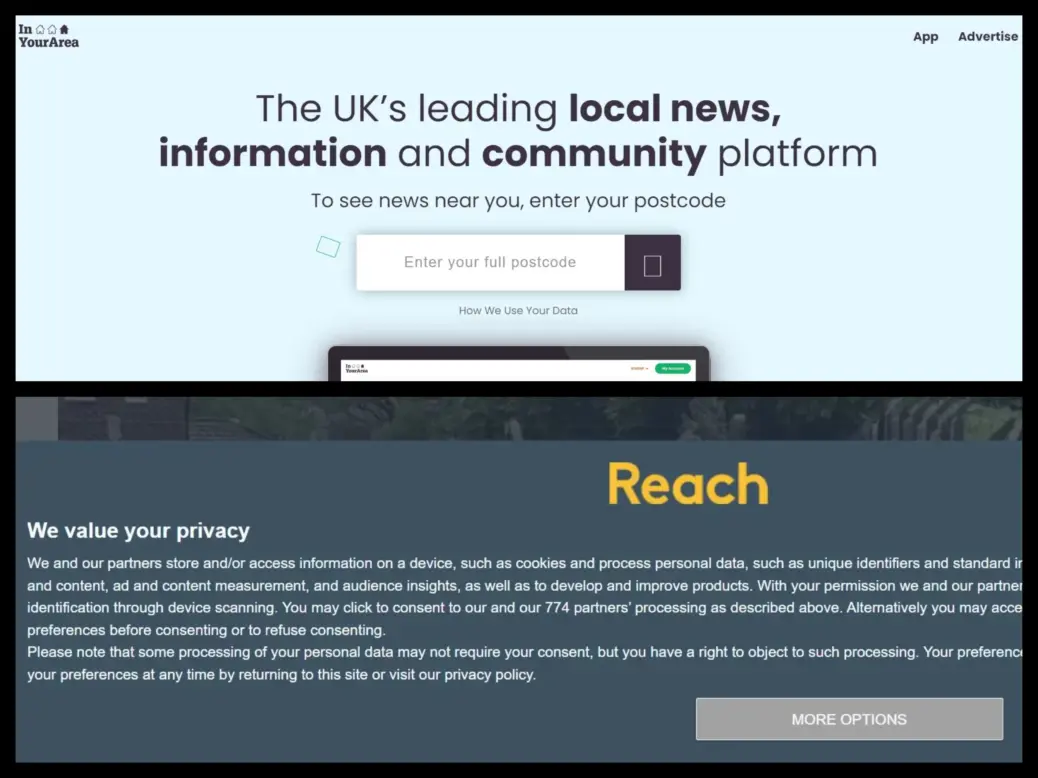
Reach’s group director of digital is “upbeat” about the publisher’s advertising strategy for the year ahead despite the phasing out of third-party cookies and what some are calling an addressability crisis.
Terry Hornsby told Press Gazette the UK’s largest commercial news publisher is focusing on “three pillars” to future-proof its digital business:
- First-party data collected through its customer value strategy
- Contextual advertising through its in-house AI-powered tool Mantis
- And industry ID and cookie-less solutions.
Hornsby said boosting revenue with this plan will ultimately allow Reach to improve the user experience on its sites – which include the Mirror, Manchester Evening News and Liverpool Echo – instead of putting people off with a high volume of sometimes intrusive ads.
Google this month began phasing out third-party cookies in Chrome, which supports the majority of internet browsing.
Speaking to Press Gazette’s Future of Media Explained podcast, Hornsby said: “The reason I’m so sort of upbeat about it is because we’ve been testing for a long time, so I think that we’re in a really good position and I’m in a comfortable position that I know that there is a solution, even if it happened tomorrow.”
Third-party cookies – strings of encrypted code that anonymously identify unique internet users and allow advertisers to make accurate guesses about their interests – were initially removed from 1% of Chrome browsers with Google saying the process will be complete by the end of the year, although industry sources believe this may be pushed back slightly. Rival browsers Firefox and Safari have already eliminated cookies.
Writing in Press Gazette, James Rosewell of the campaign group Movement for an Open Web urged publishers to support a challenge being made via the UK Competition and Markets Authority against Google’s replacement of cookies with its own in-house technology.
But Hornsby noted: “Lots of people obviously discuss about the third-party going away, but the first party is still going to be there for a long time.”
Third-party cookies track user behaviour across multiple sites and allow publishers to charge more for advertising by personalising websites to specific (anonymous) readers who have not signed in. First-party cookies will continue. These are specific to particular websites and allow publishers to preserve settings and subscriptions information, and tailor advertising for signed-in users.
Reach’s first post-cookie pillar: Customer value strategy
In 2020 Reach launched its customer value strategy centred on first-party data – in particular from people sharing their email addresses to subscribe to newsletters about their interests, or entering their postcodes to see personalised local news on the In Your Area website.
Hornsby said users need to be made aware of what they will get back by sharing their data: “I think everybody, when they talk about first-party data, they look at subscriptions straight away and that kind of area. Actually, what we’ve done is said, look, we need to understand people more, we need to give them a service or a value of content.”
Reach reported in July that it had 13.2 million registered customers, of whom 5.4 million were active on a monthly basis.
It also said data-driven revenue, meaning revenue from advertising activity in part using this first-party data, now made up 41% of total digital revenues, up from 24% four years earlier.
The more publishers know about their readers, the more relevant advertising and the higher the yields as advertisers are more likely to sell their products.
Reach’s second pillar: Contextual power of Mantis
Also included in that category are revenues from Hornsby’s second pillar: contextual advertising using Mantis, which was originally created as a brand safety tool that could determine the context and sentiment behind a story to stop so many news articles from losing out on ad revenues from advertiser keyword blocklists.
For example, Mantis could detect that a football story featuring the word “shooting” is brand safe and make sure advertising still appears on the page.
Hornsby said Reach has “seen it massively improve our campaign delivery and our scale”. Other publishers can use Mantis on a B2B basis and he added it has “opened up 50-60% of people’s inventory”.
However Hornsby and his team soon noticed that Mantis had potential beyond this: because its contextual power is “really strong”, it can drill down on the type of content the user is interested in and create the most relevant possible advertising in that environment.
This differs from retargeted advertising, which uses third-party cookies to follow people around the web showing the same adverts – often after they had already bought the product they needed or gone on the relevant holiday.
Mantis is now working on 95% of Reach campaigns, with the exceptions being ad tenancies and sponsorships. “But again, it’s either keeping campaigns safe, or it’s adding contextual value,” Hornsby said.
He explained that contextual advertising has previously been looked down upon for not being as precise or well-performing as retargeting.
But he said it can be “pretty hyper-targeted, even though I don’t know you as an individual… it’s personalised to your environment and it’s getting that person in that mindset in that environment in the right place. And for me, that’s more powerful than retargeting elsewhere.
“So, for me, it’s a really good way of our industry being privacy compliant, but also being able to drive that performance for the advertiser.”
Hornsby believes that users “engage better with it, they understand it, and they understand why they’re getting that advert in that environment” more than when they are followed around the internet.
“The other challenge is obviously with third party and retargeting it’s your IP address and your area,” he continued.
“So if you’re in a building of 500 people, and they’re all browsing different things, you could get random ads in random places that actually are retargeted, but not to you as an individual. So again, it [contextual] wipes all of that out, because as long as you’re in the right environment, you’re getting targeted with the right ads in that environment.
“So that’s where I think an industry, I think we do it a misjustice – I think contextual is as strong, if not stronger in some cases, but the challenge with contextual has always been scale. So that’s why I want to work on curated for publishers in 2024…”
Reach’s third pillar: Industry IDs and solutions
The third pillar, which is the least in Reach’s control and therefore the “furthest away” from where they want it to be, is the use of cookie-less identity solutions used to identify and track users in a privacy-compliant way.
“This year is all about really testing and seeing what the buyer side does, because we can be prepared but also there’s an educational piece of the buy side and sell side matching and coming together to find a solution,” Hornsby said.

The three pillars complement each other, he explained: “There is a clear strengthening of segments when you have somebody signed up to the football newsletter, and then you have contextual football content, and you layer that over the top, that makes it more powerful and makes that segment stronger. So the intent gets stronger from the user.
“So I think it’s not an answer for one is going to be a silver bullet. It’s going to be all together.
“And that’s why you work with the industry stuff as well – because we’ve got really powerful data here in the first party and the Mantis piece, how do we then show that in an ID piece so that somebody that’s using a third-party ID can actually access that signal and then that segment? So we’re working with the partners on passing them contextual segments and them strength signals down the pipes.”
Reach has set up ‘big circle’ of linked products
Adding to the package is the use of relevant content recommendation on article pages. Hornsby explained: “One of the solutions is get more relevant data, more contextual data, recommend more relevant content to users so then they can engage and consume more page views, and again, that leads to more data points, and again. So it’s a big circle.
“The way that we’ve kind of positioned it is so that we know that we’ve got a suite of products that are in a circle, and one will generate page views, that will generate context, then that gives an opportunity for us to go out and sell that.”
The recommender could ultimately help to improve user experience, which Hornsby described as “one of my key focuses this year” alongside bringing in revenue.
He explained that if people see “super relevant” content and click on more pages as a result, the number of ad units could be reduced.
This echoes changes at The Independent where chief executive Zach Leonard told Press Gazette last year that a reduction in the amount of ad “clutter” on story pages had led to an increase in per-page revenue because pages load faster and are better targeted towards readers’ interests.
But at Reach currently the high volume of ads is necessary as page views have fallen so it needs to squeeze more out of every click. Digital revenue and page views were both down by 16% in the first half of 2023.
Reach chief executive Jim Mullen told a staff town hall meeting on Friday that user experience is a “real struggle”, explaining: “Say there’s five ad blocks and maybe the commercial team need to put seven. Those extra two ad blocks basically interrupt a paragraph and make the page stutter. I get it, we are working really hard to find a way around this. If we did not put those ad blocks in, and did not get the additional revenue, then the cuts would have to be deeper…”
Similarly, Hornsby told Press Gazette: “We have to look at UX and we have to look at that design… we have to deliver revenue as well so it’s finding that balance. We know that even sites with no ads still have trouble with engagement. So again, it’s about the content, the quality of it and making sure that balance is there. And if you do advertising that’s relevant in the right way, you can achieve both.”
‘We don’t control the internet, we control our content’
Press Gazette has heard from some industry stakeholders frustrated that Google in particular has such power over their advertising revenue streams. But Hornsby said Reach was pragmatic as “we know and understand we don’t control the internet, we control our content. We’re a publisher, we publish our content.
“The one thing we do control is how fast we move in our own direction. So how can we prepare ourselves for what’s coming next?”
Inviting other publishers to get in touch with him directly for advice, Hornsby added: “I think every publisher has to just get on with the journey. And also just don’t be scared of asking – since my time in publishing, we’ve always sort of been all them over there and us over here. And that’s slowly blended and publishers have realised that we are competitors in the advertising world but actually, the reality is we’re competing with everybody on the internet, it’s not just publishers.
“So from our point of view, I think any publisher that’s not sure should reach out and sort of say ‘look, can I have a bit of help?’ Because there’s no shame in getting a bit of help and you’ll get ahead of the curve.”
Email pged@pressgazette.co.uk to point out mistakes, provide story tips or send in a letter for publication on our "Letters Page" blog
